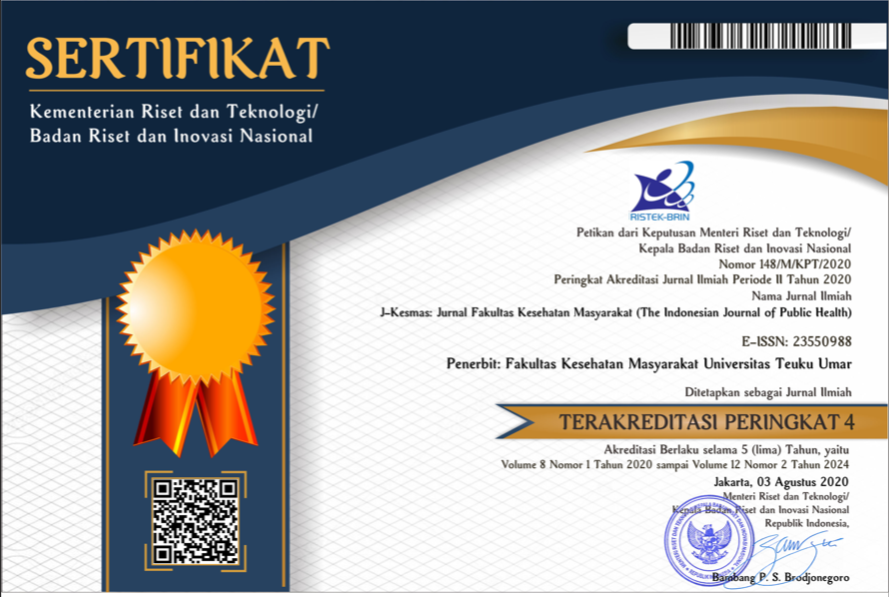The Competence of Health Workers in the Early Detection of Neonatal at the Puskesmas Ulee Kareng, Banda Aceh
Abstract
Keywords
Full Text:
PDFReferences
Azwar, S.(2015). Teori dan pengukuran sikap manusia. Pustaka pelajar. Yogyakarta.
Campbell, D. T., & Stanley, J. C. (1963). Experimental and quasi-experimental designs for research. USA: Houghton Mifflin Company. Erişim, 2(04), 7-12.
Dirjen Bina Gizi & KIA. (2013). Pedoman manajemen terpadu balita sakit berbasis masyarakat (MTBS-M). Jakarta.
Sukiarko, E. (2007). Pengaruh pelatihan dengan metode belajar berdasarkan masalah terhadap pengetahuan dan keterampilan kader gizi dalam kegiatan posyandu studi di kecamatan tempuran kabupaten magelang. (Doctoral dissertation, program Pascasarjana Universitas Diponegoro).
Hastono, S. P. (2007). Analisa data kesehatan: basic data analysis for health research training: Depok. FKM UI.
Ministry of Health, R. I. (2012). Kurikulum dan modul pelatihan kader posyandu. Jakarta, Kemenkes RI.
Ministry of Health, R. I. (2016). Profil kesehatan indonesia tahun 2015. Jakarta, Kementrian Kesehatan Republik Indonesia, 178-181.
Kirkpatrick, D. L., & Kirkpatrick, J. D. (1998). Evaluating training programs: the four levels. Berrett.
Kirkpatrick, J. D., & Kirkpatrick, W. K. (2016). Kirkpatrick's four levels of training evaluation. Association for Talent Development.
Maulidta, K. W., & Prasetyorini, H. (2017). Upaya peningkatan ketrampilan kader posyandu dalam pengukuran tekanan darah melalui pelatihan kader. Jurnal Ilmu dan Teknologi Kesehatan, 7(2), 27-29.
Miskin, S., Rompas, S., & Ismanto, A. Y. (2016). Hubungan pengetahuan ibu dan peran kader dengan kunjungan balita di posyandu wilayah kerja puskesmas Pineleng. Jurnal Keperawatan, 4(1). 1-6
Notoatmodjo, S. (2003). Pendidikan dan perilaku kesehatan. Jakarta: rineka cipta, 16, 15-49.
Putriningtyas, D. A. T., Djufri, S., & Putri, H. A. (2016). Pengaruh Pelatihan Deteksi Dini Tumbuh Kembang Balita (DTKB) Terhadap Motivasi Dan Ketrampilan Kader Di Dusun Soragan Ngestiharjo Kasihan Bantul.
Rusmilawati, R., Adhani, R., & Adenan, A. (2017). Pengaruh Pelatihan Terhadap Pengetahuan Sikap Dan Ketidakrasionalan Pengobatan Diare Non Spesifik Sesuai MTBS Pada Balita. Jurnal Berkala Kesehatan, 1(2), 52-59..
UNICEF. (2012). Ringkasan kajian kesehatan ibu dan anak. UNICEF Indonesia, Jakarta,
World Health Organization. (2004). Child health in the community: community IMCI: briefing package for facilitators.
Wijaya, M. (2014). Pengembangan model pelatihan partisipatif berbasis gender dalam meningkatkan kompetensi kader tentang kesehatan ibu dan anak: studi terhadap kader kesehatan di desa pataruman kecamatan cihampelas kabupaten bandung barat (Doctoral dissertation, Universitas Pendidikan Indonesia).
DOI: https://doi.org/10.35308/j-kesmas.v7i2.2713
Refbacks
- There are currently no refbacks.
Managed by Fakultas Kesehatan Masyarakat
Published by Universitas Teuku Umar
Website: http://jurnal.utu.ac.id/jkesmas
Email: jkemas@utu.ac.id 
This work is licensed under a Creative Commons Attribution-ShareAlike 4.0 International License.







.jpg)


